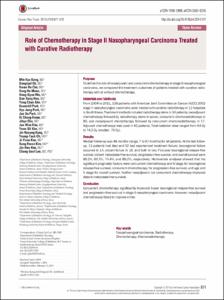KUMEL Repository
1. Journal Papers (연구논문)
1. School of Medicine (의과대학)
Dept. of Radiation Oncology (방사선종양학)
Role of chemotherapy in stage II nasopharyngeal carcinoma treated with curative radiotherapy
- Keimyung Author(s)
- Kim, Jin Hee
- Department
- Dept. of Radiation Oncology (방사선종양학)
- Journal Title
- Cancer Research and Treatment
- Issued Date
- 2015
- Volume
- 47
- Issue
- 4
- Abstract
- Purpose
To define the role of neoadjuvant and concurrent chemotherapy in stage II nasopharyngeal
carcinoma, we compared the treatment outcomes of patients treated with curative radiotherapy
with or without chemotherapy.
Materials and Methods
From 2004 to 2011, 138 patients with American Joint Committee on Cancer (AJCC) 2002
stage II nasopharyngeal carcinoma were treated with curative radiotherapy in 12 hospitals
in South Korea. Treatment methods included radiotherapy alone in 34 patients, neoadjuvant
chemotherapy followed by radiotherapy alone in seven, concurrent chemoradiotherapy in
80, and neoadjuvant chemotherapy followed by concurrent chemoradiotherapy in 17.
Adjuvant chemotherapy was used in 42 patients. Total radiation dose ranged from 64 Gy
to 74.2 Gy (median, 70 Gy).
Results
Median follow-up was 48 months (range, 7 to 97 months) for all patients. At the last followup,
13 patients had died and 32 had experienced treatment failure; locoregional failure
occurred in 14, distant failure in 16, and both in two. Five-year locoregional relapse-free
survival, distant metastasis-free survival, progression-free survival, and overall survival were
86.2%, 85.5%, 74.4%, and 88.2%, respectively. Multivariate analyses showed that the
significant prognostic factors were concurrent chemotherapy and N stage for locoregional
relapse-free survival, concurrent chemotherapy for progression-free survival, and age and
N stage for overall survival. Neither neoadjuvant nor concurrent chemotherapy improved
distant metastasis-free survival.
Conclusion
Concurrent chemotherapy significantly improved 5-year locoregional relapse-free survival
and progression-free survival in stage II nasopharyngeal carcinoma. However, neoadjuvant
chemotherapy failed to improve either.
- Keimyung Author(s)(Kor)
- 김진희
- Publisher
- School of Medicine
- Citation
- Min Kyu Kang et al. (2015). Role of chemotherapy in stage II nasopharyngeal carcinoma treated with curative radiotherapy. Cancer Research and Treatment, 47(4), 871–878. doi: 10.4143/crt.2014.141
- Type
- Article
- ISSN
- 1598-2998
- Appears in Collections:
- 1. School of Medicine (의과대학) > Dept. of Radiation Oncology (방사선종양학)
- 파일 목록
-
-
Download
 oak-2015-0206.pdf
기타 데이터 / 487.57 kB / Adobe PDF
oak-2015-0206.pdf
기타 데이터 / 487.57 kB / Adobe PDF
-
Items in Repository are protected by copyright, with all rights reserved, unless otherwise indicated.